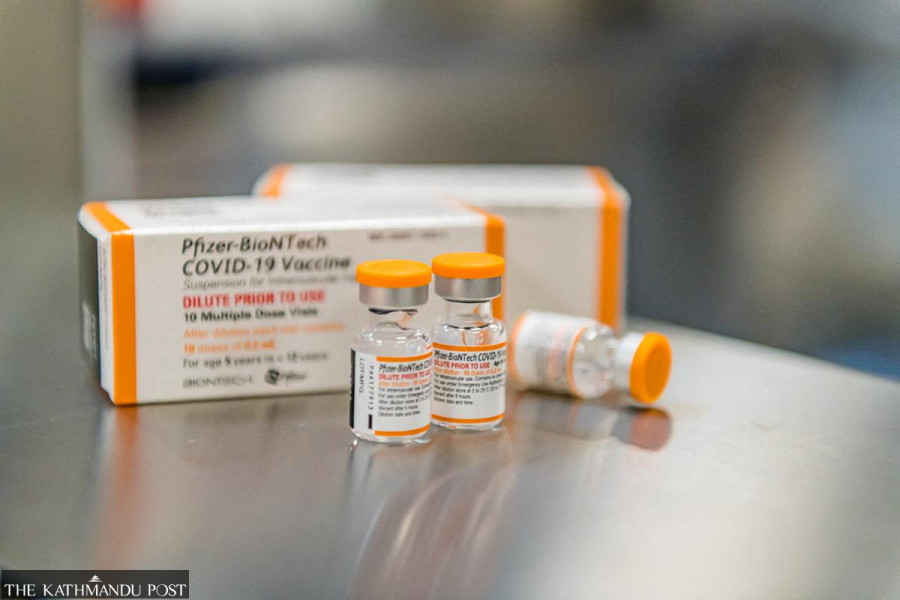Health
Over 2.2 million paediatric doses of Covid-19 vaccine arrive from COVAX
The vaccine doses will be used as first and second doses in the 27 districts, where the first phase of vaccination campaign was launched from June 23.
Arjun Poudel
Nepal received 2,299,200 million Pfizer doses of Covid-19 vaccine from the COVAX facility on Sunday.
The vaccine doses are the second consignment and are part of the 8.4 million doses committed by the the United Nations-backed international vaccine sharing scheme.
“We received the vaccine doses from the COVAX facility today,” said Badebabu Thapa, an official at the Logistic Management Section under the Department of Health Services.
The facility had supplied over 2.2 million doses on June 19, which was administered to children aged between five and 11 from 27 districts from June 23 to June 29.
The Health Ministry has decided to use vaccine doses arrived on Sunday as first and second doses in the 27 districts.
Thousands of children were deprived of the jabs as authorities fell short of vaccine doses.
“We will continue vaccination in the districts, where the immunisation programme was halted due to lack of vaccine doses,” said Sagar Dahal, chief of the National Immunisation Programme. “Remaining doses will be used as second doses.”
The Health Ministry has planned to administer the second dose of the vaccine to children from July 18 to 25.
Children of the same age group in Jhapa, Morang, Sunsari, Saptari, Dhanusha, Parsa, Siraha, Mahottari, Kathmandu, Lalitpur, Bhaktapur, Chitwan, Kavrepalanchok, Sindhuli, and Nawalparasi West were inoculated in the first phase.
Rupandehi, Banke, Dang, Kapilvastu, Bardiya, Surkhet, Kailali, Kanchanpur and Dadeldhura were other districts where the first phase of the campaign was launched.
The Health Ministry had estimated that there are around 2.2 million children of the same age group in the same districts.
There are two types of Pfizer-BioNTech Covid vaccines for children—one is for those between five and 11 years, and another for those aged 12 and above. Nepal has already used Pfizer vaccines on those with comorbidities and on children between 12 and 17 years.
The Pfizer-BioNTech vaccine is the only jab recommended by the World Health Organization for use in children between five and 11 years old.
The American Association of Paediatrics has recommended administering 10 microgram doses in a gap of 21 days to children between five and 11 years. The dose, 0.2ml, is one-third of what is administered to adolescents and adults.
The vaccine vial for 5–11 year olds comes with an orange cap while the other vial is purple-capped.
Each vial with 10 doses needs 1.3 millilitres (ml) of diluent under Pfizer’s preliminary plan.
The US Food and Drug Administration in October authorised emergency use of the Pfizer-BioNTech Covid vaccine in children between five and 11 years. Several countries have already started administering the vaccine to children.
Officials said that there will not be storage problems for the Pfizer doses, as they are planned to be supplied to the provinces and districts.
Although the Pfizer doses for adults can be kept in normal temperatures (2 to 8 degrees Celsius) for up to 31 days, paediatric doses can be stored in normal temperatures for up to 10 weeks, officials said.
Nepal has so far received 57,883,970 doses of Covid vaccines of various brands—AstraZeneca, Vero Cell, Moderna, Janssen, Sinovac-CoronaVac, and Pfizer-BioNTech—including paediatric doses.
As many as 20,350,049 people or 69.9 percent of the total population have been fully immunised so far.




 11.43°C Kathmandu
11.43°C Kathmandu















